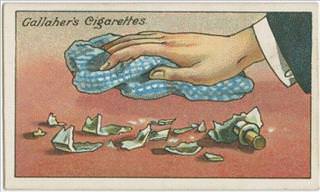

Despite it not being its literal meaning, when you use the word ‘just’ in a sentence people usually transform it in their minds to ‘merely’ as an adverb. This filler word can soften what you’re trying to say, but not necessarily in a good way. Rather, it tends to make you sound less confident.
For example, when you say ‘I was just wondering’, other people hear it as ‘I was merely wondering’ and that comes across as "diminished, disingenuous and defensive” according to language experts. It can make you seem like you have less expertise in what you’re discussing, which is not an impression you’d want to make.
Related: These 8 Mistakes Are the Biggest Conversation Killers

Everyone knows that when ‘but’ comes up in a conversation, it might be bad news. After all, it typically has the power to negate everything that has been said before it. "It can also be perceived as a way to diminish or undercut the object of the sentence or the person being spoken to," explains management consultant, executive coach, and facilitator Liz Kislik.
So how can you give constructive critique or feedback without the word ‘but’? Kislik suggests two replacements: ‘and’ or ‘now’. The word ‘and’ makes it feel as though you’re adding to what you said rather than contradicting it, while ‘now’, when used after a pause, gives the sense of ‘next’ moving on in the conversation.
Cutting out the ‘buts’ and using these alternatives will help your conversation partners feel more open to hearing what you have to say, and feel like you’re leading to something positive rather than undercutting what you said before.


Words have power, even those we say to ourselves. The word ‘should’ allows us to be actively critical of ourselves. ‘I should or shouldn’t be doing this and that…’ suggest that we don’t accept ourselves or where we are in life, explains clinical psychologist Sophie Mort.
Even this small form of rejection can lead to stress and anxiety, which does the opposite of helping us. “It can shut down our brain's ability to problem solve and to maintain attention to a new task," said Mort. At the end of the day, anxiety over what we ‘should’ be doing can be the very thing that prevents us from doing that, creating a cycle of stress.


Get Rid of These Body Language Habits Today!
Body language is intuitive, so it can easily convey a wrong message or reveal insecurities. Here are 9 simple tweaks that help you avoid these misunderstandings.

Not Just Cardio: 6 Activities That Boost Heart Health
Can't manage to squeeze in a cardio class every week? Here are a few ways to sneak in cardio in everyday life and maintain heart health.

These 15 Tips Will Make You Loved, Happy & De-Stressed
Here are 15 easy to understand tricks that will change you life, making your happier, more liked and less stressed. You've got to try these!

6 Common Mistakes That Can Ruin Your Barbecue
A few common mistakes to avoid if you want to get that perfect flavorful home barbecue.
 11:55
11:55
Priceless Expert Tips on How to Utilize Your Free Time
In this Ted Talk time management expert Laura Vanderkam offers a few practical strategies to help find more time for what really matters to us

Skipping Showers? It May Be the Healthier Choice
If you don't don't shower on a daily basis, there's no reason to be embarrassed. It might actually be the healthier choice...

Retirement Planning: The 7 Biggest Mistakes People Make
Are you guilty of making these 7 deadly mistakes in your retirement financial plan? Here are seven offenses on how to get back on track.

Bacteria Time Bomb! 10 Household Items That Need Changing
You wouldn't believe the amount of harmful bacteria these common household items store, and what what a short lifespan they actually have!

9 Ultimate Methods for Stain Removal around the House
Things we;ve had for a long time tend to lose their fresh-out-the-box look but this can be remedied! These methods will help you remove those stubborn stains!

Can My Dog Eat That? An Important Infographic for Dog Owners
If you want to keep your dog safe and happy, you need to know what foods they can and cannot eat.

4000 Years of History in One Glorious Map
In one incredible map we see thousands of years of history.

15 Great Tips for Cleaning Those Hard-to-Reach Spots
Have you ever skipped cleaning places and things around the house that were just too difficult to clean? Well, we have just the tips to help you with these spots!

Read These Tips Before Trimming Your Own Hair
Cant wait until social distancing is over and hair salons and barber shops reopen? We have collected the best tips on how to trim your own hair

DIY: Make Your Own Wall Stencil in 8 Easy Steps
Get a designer look for half the price. This easy DIY guide will show you how to make a beautiful wall stencil in 8 easy steps.

Impress Your Kids & Grandchildren With These DIY Toys
Whether you're looking for a new hobby or a way to save yourself a fortune on kids' toys and activities, this video box has certainly got you covered!
 4:34
4:34
7 Super Useful Embroidery Tips and Hacks
Get to know 6 tricks for creating beautiful embroidery designs on clothes—perfect for beginners, but also for those already familiar with the technique.

Lemons in the Oven? Read This Article to Find Out Why
Sick of mosquitoes and flies visiting your house? This surprising method will help you get rid of them effortlessly using lemons and an oven!

A Must Have Kitchen Cheat Sheet to Help With Any Recipe!
Simple fact sheets that will turn any cooking job easier to understand.

10 Foods that Naturally Whiten Your Teeth
There's nothing like a pearly white smile and healthy teeth, and with these 10 wonderful foods, you can achieve these without the need for harsh chemicals!

This is Why Getting Distracted Can Be Good For You
People think that getting distracted is a bad thing, but recent studies have actually disproved this. Learn more here!

These Useful Vintage Tips from the 1900s Still Work Today!
Not everything changes over time, which is why these vintage solutions to everyday problems are still as useful today as they were in the 1900s!

11 Things You Should NEVER Dump Into the Kitchen Sink
Even a garbage disposal won’t be able to handle these 11 things, so make sure to toss them directly into the trash instead of the kitchen sink

The Surprising Uses of Lemon Salt Outside the Kitchen
Here’s a look at some unexpected ways to use lemon salt beyond the kitchen.

7 Mistakes We Generally Make While Arranging Furniture
Here's a look at some furniture arranging mistakes you should always avoid and how you can fix them.

Sparklers Are Safe for Children, Right? Think Again
Every year, thousands of people are injured due to unsafe conduct around fireworks. Here are tips to safely use recreational pyrotechnics.
 9:20
9:20
Why Do We Pop Our Ears, and What if it Fails?
Dive into the mechanics of this necessary, yet often overlooked, bodily function of popping your ears.

How to Use Essential Oils Without An Expensive Diffuser!
Do you love essential oils, but you’re not ready to spend a lot of money on them or a diffuser? This article will help!

Items You Keep on the Kitchen Counter But Really Shouldn’t
Do you keep a knife holder on the kitchen counter? What about a jar with coffee or spices? Learn why that’s probably a bad idea...

Can't Name that Color? Just Use Our Handy Color Guide...
No more arguing about what color it is, from now on you have all the colors at your fingertips...

Body Wash vs. Bar Soap: Which One Should You Choose?
Body wash or shower gel? Which one do you prefer? If you’re uncertain, we’ll help you find out when to use each one.
 4:12
4:12
The Genius Ways to Wrap Awkwardly Shaped Gifts
To save yourself a little money, and to help you get a tad more creative this festive season, we've got the perfect solution for you.

8 Spice Plants Perfect to Plant for the Fall Season
Here are 8 fragrant and delicious herbs that are highly recommended to grow yourself, including growing instructions for each one of them.

Remove Unwanted Hair with These Natural Remedies
Got unwanted upper lip hair? Here's how best to remove it.

This is Why Paper Towels Are an Invaluable Necessity
If you're only using your paper towels to mop up the occasional kitchen accident, you're sure missing out. Here are 6 other uses for paper towels.

Keep Your House Smelling Amazing with These DIY Tips
These are some of the best and cheapest things you can do to make any part of your home smell nice and welcoming.

How to Create a Low-Maintenance Garden
This guide will provide practical advice on designing and maintaining a low-maintenance garden, from plant choices to time-saving techniques.

Have Your White Clothes Lost Their Brightness? Try This!
Restore your clothes to their former glory with this natural remedy.

15 Surprising Uses of Potatoes Outside the Cooking Pot
Potatoes are a great staple of many food dishes around the world, but they also have many uses outside of the kitchen. These will surprise you!

Your Herb Garden Will Flourish with These Helpful Tips
The following six tips will help you grow an abundance of herbs round the year.

12 Great Advantages of Being Bald
You thought hair loss and going bald was a BAD thing? Well, think again, as we go over everything that's great about being bald!

Replace These Popular Drinks With These Healthier Ones!
The most popular cocktails contain alcohol and a lot of calories. Thankfully there are healthier cocktail alternatives. Take a look! The most popular cocktails contain alcohol and a lot of calories.
 7:40
7:40
Learn These 5 Kitchen Tips from a World-Class Master Chef
Here are 5 unmissable kitchen tips that will transform your cooking experience. They should have taught us useful information like this at school.

10 Kitchen Tips That Will Turn You into a Culinary Master
The following 10 kitchen tips will take you one step closer to becoming a culinary god.
 12:28
12:28
32 Tips and Tricks for Beginners to Sewing
In the following video, we've carefully curated 32 essential tips and tricks to ease your entry into the world of sewing.

13 Great Secret Hiding Spots That Burglars Will Never Find
Here are a few practical places to properly hide your cash and valuables from professional criminals.

Ever Thought of Using Vaseline in These Practical Ways?
Did you know Vaseline would have so many purposes in the house, in cosmetics, and in beauty? Check out the amazing list of uses!

These 11 Tips and Tricks Will Help You Enjoy Avocados Better
Avocado is one of the most popular fruits, and with the following 11 tips, you'll know how to check for ripeness, freshness and how to use in myriad ways...


